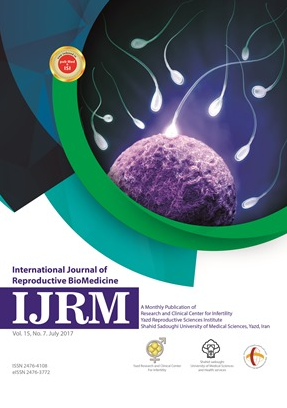
International Journal of Reproductive BioMedicine
ISSN: 2476-3772
The latest discoveries in all areas of reproduction and reproductive technology.
Pregnancy after in vitro fertilization in an elderly primigravida with Shereshevsky-Turner Syndrome: A case report
Published date: Feb 08 2023
Journal Title: International Journal of Reproductive BioMedicine
Issue title: International Journal of Reproductive BioMedicine (IJRM): Volume 21, Issue No. 1
Pages: 83–88
Authors:
Abstract:
Background: Shereshevsky-Turner Syndrome is a chromosomal condition that affects females owing to full or partial missing of X-monosomy in all or part of the body’s cells. Shereshevsky-Turner Syndrome is characterized by severe hormonal disorders and defects of the cardiovascular and urinary systems. With the advent of assisted reproductive technology (ART), pregnancy has become more accessible for this group of cases, often with donor eggs. In the available literature, it was not possible to find exact information during the time of selection of progestogen support, the duration of the appointment, and the term of withdrawal.
Case presentation: This is the case of a 36-yr-old primigravid woman suffering from STs, mosaic karyotype comprising of 3 clones: 45X (69), 46XX (23), 47XXX (8), and 1000 interphase nuclei. In this case, we left high-maintenance doses of progesterone due to the application of ART and concomitant extragenital pathology, leading to a decrease in all functions of the placenta, including the endocrine. The woman was monitored before, during, and after the pregnancy. She was delivered at 37 wk and 6 days of gestation.
Conclusion: ART increases the possibility of having a pregnancy and gestation in cases with a wide variety of genital and extragenital pathologies.
Key words: Turner syndrome, Pregnancy, Infertility, Hypogonadism, Progesterone.
References:
[1] Gravholt CH, Miff MH, Brun S, Stochholm K, Andersen NH. Turner syndrome: Mechanisms and management. Nat Rev Endocrinol 2019; 15: 601–614.
[2] Abdulganieva DI, Odintsova Akh, Mukhametova DD, Rama Zanova Akh, Bodryagina ES, Chomyakov AE. [Pregnancy inpatient with mosaic turner’s syndrome and cirrhosis in the outcome of autoimmune hepatitis type 1]. Exp Clin Gastroenterol 2017; 5: 70–73. (in Russian)
[3] Hagman A, Loft A, Wennerholm U-B, Pinborg A, Bergh C, Aittomäki K, et al. Obstetric and neonatal outcome after oocyte donation in 106 women with Turner syndrome: A Nordic cohort study. Hum Reprod 2013; 28: 1598 1609.
[4] Bernar V, Donadille B, Zenaty D, Courtillot C, Salenave S, de la Perrière AB, et al. Spontaneous fertility and pregnancy outcomes amongst 480 women with Turner syndrome. Hum Reprod 2016; 31: 782–788.
[5] Grigoryan OR, Mikheev RK, Volevodz NN, Andreeva EN, Melnichenko GA, Dedov II. [Endocrine aspects of fetoplacental complex function: A review]. Problems Reprod 2017; 2: 4–7. (in Russian)
[6] Alekseyeva LL, Protopopova NA. [The state of the placental system and the hormonal function of the placenta in women with arterial hypertension in different ethnic groups]. Siberian Med Sci 2012; 2: 11–13. (in Russian)
[7] Bitsadze VO, Makatsaria AD, Hizroeva DH, Makatsariya NA, Yashenina EV, Kazakova LA. [Thrombophilia, as the most important link in the formation of pregnancy complications]. Pract Med 2012; 5: 60–61. (in Russian)
[8] Silberbach M, Roos-Hesselink JW, Andersen NH, Braverman AC, Brown N, Collins RT, et al. Cardiovascular health in turner syndrome: A scientific statement from the American Heart Association. Circ Genom Precis Med
2018; 11: e000048.